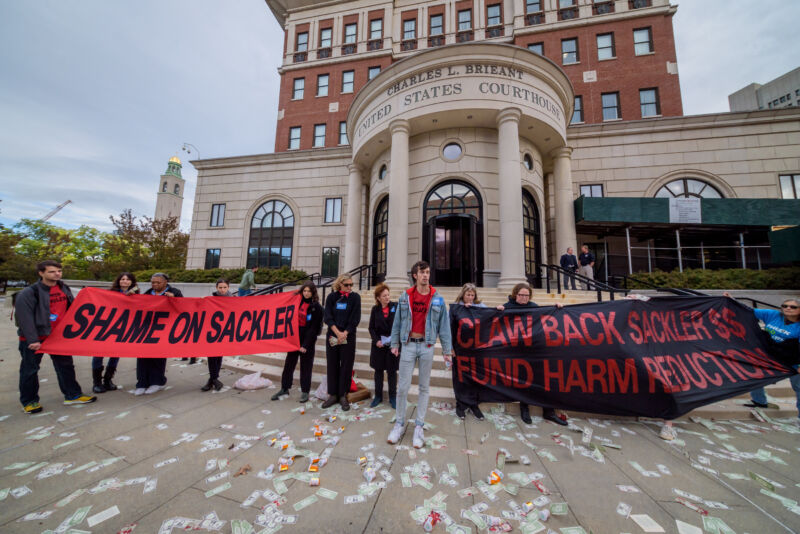

Sacklers gave $19M to National Academies amid influential pain, opioid reports
source link: https://arstechnica.com/science/2023/04/sacklers-gave-19m-to-national-academies-amid-influential-pain-opioid-reports/
Go to the source link to view the article. You can view the picture content, updated content and better typesetting reading experience. If the link is broken, please click the button below to view the snapshot at that time.

Hooked —
Sacklers gave $19M to National Academies amid influential pain, opioid reports
The National Academies said it tried to give it back but couldn't.
Beth Mole - 4/25/2023, 1:13 PM

Members of the Sackler family—the infamous, mega-wealthy family largely seen as sparking the nationwide opioid epidemic—donated roughly $19 million to the National Academies of Sciences, Engineering and Medicine while the organization drafted two reports that influenced national policies around opioids, according to an investigation by The New York Times.
The revelation is another glimpse at the extent to which the Sacklers apparently tried to manipulate science and policy to plump its profits. The report also raises questions as to why the National Academies has been quiet about the donations and has not conducted a review of whether the funds and other potential conflicts of interest influenced its reports. The Times notes that in 2019, the World Health Organization retracted two opioid guidance documents after a review backed up concerns that the drafting process had been influenced by opioid manufacturers, including the Sacklers' Purdue Pharma.Members of the Sackler family owned and largely directed Purdue Pharma in the late 1990s when the company allegedly began aggressively and deceptively selling its highly addictive opioid painkiller, OxyContin. The Sacklers are estimated to have raked in more than $10 billion from opioid sales in the years after.
According to the Times report, Raymond Sackler and his wife, Beverly Sackler, who were both heavily involved with Purdue, began donating to the National Academies in 2008. They donated around $14 million in total before their deaths in 2017 and 2019, respectively. Jillian Sackler, the widow of Arthur Sackler, who died before Purdue began selling OxyContin, began donating in 2000, with the total reaching $5 million by 2017.
Meanwhile, in 2007 and 2009 a lobbyist for Purdue Pharma, Burt Rosen, pushed for legislation that would direct the National Academies to convene a "Conference on Pain" that would "increase the recognition of pain as a significant public health problem in the United States." When the legislation was passed in 2010, Rosen held a 10 pm meeting of the Pain Care Forum, a group of drug companies and affiliates, to discuss meeting with the National Academy of Medicine (then the Institute of Medicine) and becoming members.
AdvertisementConcerning committees
In 2011, the National Academies released a report called "Relieving Pain in America," which put forth the questionable estimate that 100 million adults—or 42 percent—in the US suffered from chronic pain. The Centers for Disease Control and Prevention would later peg the percentage between 7 percent and 21 percent, depending on the severity. But, for years, the 100 million figure was used as a talking point in opioid marketing and appeared to influence federal agencies' actions and doctors' prescribing. The Times noted that some of the report's authors had financial ties to Purdue, but there were no conflicts of interest disclosed.
In 2016, the National Academies began setting up another committee to work on a report aimed at addressing the epidemic of opioid overdoses and addiction. But, as members were provisionally assembled, Senator Ron Wyden, a Democrat of Oregon, raised concerns that at least two of the possible committee members had clear ties to drug makers, including Purdue. While Wyden was not able to vet all the potential members, the findings from just the two were "extremely troubling, and strongly suggest" that the Academy needed to do a better job of reviewing potential members, he wrote in a letter to the president of the National Academies at the time. After that, the National Academies removed four people from the committee.A spokesperson for the National Academies told the Times that the organization did not release conflict statements from members. But, in a statement, the spokesperson said that the Sackler's direct donations to the organization “were never used to support any advisory activities on the use of opioids or on efforts to counter the opioid crisis." The statement also noted that the National Academies tried to give the money back, but the Sacklers wouldn't accept the return.
Purdue has pled guilty twice for wrongdoing in its marketing of OxyContin. In 2020, the Department of Justice announced a roughly $8.3 billion settlement with Purdue over criminal and civil charges, with members of the Sackler family agreeing to pay $225 million over civil charges. Purdue and the Sacklers are still held up in bankruptcy court over a plan to resolve thousands of other opioid cases. The family had previously worked to get a $4.5 billion settlement deal that would grant them sweeping lifetime legal immunity from further opioid-related litigation, but the settlement was later rejected by a federal court over the immunity condition.
Recommend
About Joyk
Aggregate valuable and interesting links.
Joyk means Joy of geeK